#London International Awards
Photo
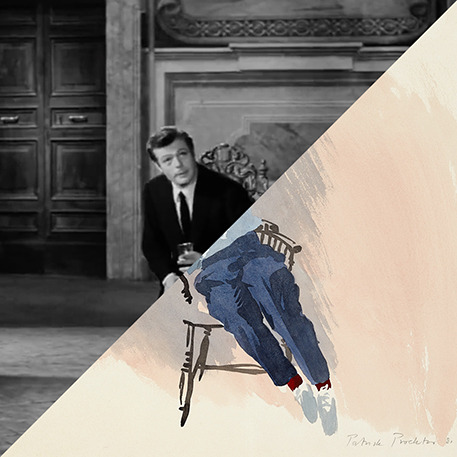
Federico Fellini, La dolce vita, 1960
VS
Patrick Procktor, Dominic Prima, 1981
#federico fellini#dolce vita#la dolce vita#cinema#movie#cinecittà#the oscars#Academy Award for Best International Feature Film#academy awards#marcello mastroianni#tuscia#palazzo Giustiniani Odescalchi#bassano romano#patrick procktor#swingin london#watercolor#art#contemporary art#collage#cut and paste
50 notes
·
View notes
Photo

Game Room - Contemporary Family Room
Example of a large trendy open concept limestone floor game room design with white walls, no fireplace and no tv
#london#library#rolling library ladder#international design excellence awards#interior design#refurbishment
2 notes
·
View notes
Photo
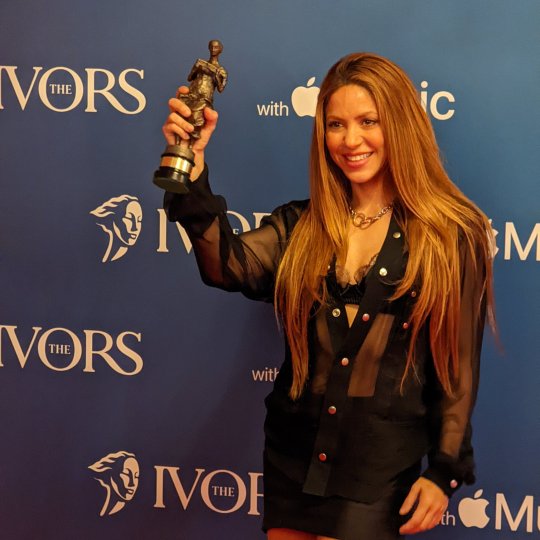
New photo of Shakira posing with her Special International Award at The Ivor Novello Awards 2022 at The Grosvenor House Hotel in London, England. (May 19, 2022)
📸: PRSforMusic
#shakira#shakira mebarak#celebs#celebrities#the ivor novello awards 2022#special international award#the grosnever house hotel#london#england#new photo#photo#may 2022
12 notes
·
View notes
Text
Aha - Take On Me
1985
"Take On Me" is a song by the Norwegian synth-pop band A-ha. The original version from 1984 was produced by Tony Mansfield and remixed by John Ratcliff. The 1985 international hit version was produced by Alan Tarney for the group's debut studio album, Hunting High and Low.
In 1984, Andrew Wickham was the international vice-president for Warner Bros Records America, and their A&R man in London. He immediately signed A-ha to Warner Brothers America, after learning several previous attempts had failed to make "Take On Me" a commercial success. The next release was not successful either and featured a very ordinary performance video. He authorised considerable investment in the band: on Slater's recommendation, renowned producer Alan Tarney was commissioned to refine the song. The new recording achieved a cleaner and more soaring sound. It was re-released in the UK, but the record label's office in London gave them little support, and the single flopped for the second time.
Wickham placed the band on high priority and applied a lateral strategy with further investment. Steve Barron directed a revolutionary rotoscoping animation music video which took six months to create, using professional artists. Approximately 3,000 frames were rotoscoped, which took 16 weeks to complete. The single was released in the US one month after the music video, and immediately appeared in the Billboard Hot 100 and was a worldwide smash, reaching No. 1 in numerous countries.
At the 1986 MTV Video Music Awards, the video won six awards: Best New Artist in a Video, Best Concept Video, Most Experimental Video, Best Direction in a Video, Best Special Effects in a Video, and Viewer's Choice, and was nominated for two others, Best Group Video and Video of the Year. It was also nominated for Favorite Pop/Rock Video at the 13th American Music Awards in 1986.
"Take On Me" received a total of 95% yes votes, and is currently the most liked song on this poll blog! 🥳
youtube
7K notes
·
View notes
Text
Awards Season 2022-23: BAFTA Winners and Awards Round-Up 2/20
A film I’d never heard of – but at least one awards group really loved it.
The BAFTAs were today. And…they made things interesting. My breakdown of the nominees is here.
Best Film: All Quiet on the Western Front
Not entirely surprising. They threw nominations at this one wholesale. This certainly bodes well for the Oscars, although it’s missing key nominations – Director, Editing, or any…

View On WordPress
#AARP Movies for Grownups Awards#Awards Season 2022-23#BAFTA#BAFTA Awards#Black Reel Awards#British Academy of Film and Television Arts#Chicago Indie Critics#Film Awards#Houston Film Critics Society#International Cinephile Society#Kansas City Film Critics Circle#London Film Critics Circle#Online Film Critics Society#Vancouver Film Critics Circle
0 notes
Text
Sting My Songs Tour Bratislava Slovakia
Sting My Songs Tour Bratislava Slovakia

View On WordPress
#"A Guide to Recognizing Your Saints”#1989 Beggar&039;s Opera Broadway#Amnesty International#Andy Summers#“The Last Ship”#Billboard Magazine Century Award#Bratislava Winter Stadium Ondrej Nepela#Brit Awards#Dominic Miller Guitarist#Emmy Award#Gene Noble Singer#Golden Globe Award#Grammy Awards#Joe Sumner Singer and Songwriter#Josh Freese Drummer#Kevon Webster Keyboard#La Seine Musicale Paris#Live Aid Concerts#London Palladium#Melissa Musique Singer#Message in a Bottle#My Songs Tour#Oscars#Person of the Year Award MusiCares#Rainforest Fund#Rock and Roll Hall of Fame#Rufus Miller Guitarist#Shane Sager Harmonica#Shane Sager Harmonica – Harmonica#Stewart Copeland
1 note
·
View note
Text
The Ugly Green Emotion
Part One
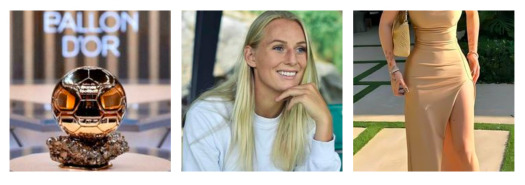
In which: Swedish!Reader has a killer season for club and country, getting herself nominated for the Ballon D’or. As Stina wasn’t nominated and since she and R are still keeping things on the hush, she doesn’t go as R’s plus one.
When she sees the way R’s ex looks at her, a certain ugly green emotion begins to form.
—-
Stina settled in bed with her laptop and a warm cup of tea. North London, despite its flaws, had been having some great weather recently. She was in one of your sweaters. Everything was perfect.
The only thing missing was you.
But there was no reason for her to be down about it. Her eyes were glued to her screen as she loaded up the Ballon D’or stream, her laptop screen immediately displaying nominees arriving at the Théâtre Du Châtelet in Paris. She sought you out, trying to see if you and your Barca teammates had arrived yet.
Stina caught more glimpses of other players before she even caught one of you, her anticipation growing as to what your outfit would look like. You had teasingly refused to show her over Facetime, and even during the little international break that you had, you had always managed to sweet-talk your way into talking about something else. It was infuriating, but in the best way possible.
As the stream continued, Stina's heart skipped a beat when she finally caught a glimpse of you, her breath catching in her throat at the sight of your radiant smile. You looked stunning, as always, your hair styled elegantly and your dress fitting you like a glove. Stina couldn't tear her eyes away from the screen, her heart swelling with pride as she watched you step out of the car, surrounded by your Barcelona teammates.
“Fuck, she looks incredible,” Stina murmured to herself, a fond smile tugging at the corners of her lips as she admired you from afar. She couldn't help but feel a twinge of jealousy as she spotted Aitana by your side, the two of you sharing a brief exchange before making your way into the theatre. Her heart clenched at the sight of your ex-girlfriend, but she pushed aside her insecurities, reminding herself that you had ended things amicably.
Stina took a sip of her tea, her eyes never leaving the screen as she watched the ceremony unfold. She knew that the Ballon d'Or was a significant moment for you, and she was determined to support you from afar, even if it meant battling her own jealousy. She would’ve loved to come with you, keep her hand on the small of your back, looking at you admiringly whenever you were interviewed. You were both private people, and always valued your privacy, even when you were still playing for Arsenal.
At Arsenal, only one other teammate knew that the two of you were dating, Stina's Norwegian best friend, Frida Maanum. It had been completely unintentional, the way she found out. She and her girlfriend, Emma, had come over to surprise you two for dinner.
Only to find the two of you getting up to some… sinful stuff on Stina's couch.
As Aitana was announced as the winner of the Ballon d'Or, Stina's heart sank a little, despite literally being told by you beforehand that you were placing in the top 5, but she managed to keep a supportive smile on her face. She watched Aitana make her way up to the stage to accept the award. Her gaze shifted back and forth between Aitana and you, noticing the way Aitana's eyes kept drifting over to where you were sitting. She couldn't help but feel a pang of irritation as she watched Aitana give her thank-you speech, her eyes lingering on you for just a little too long.
And when the camera panned over to you, giving Aitana a thumbs up, Stina's jealousy flared up even more. She clenched her fists, trying to push aside the ugly green monster that threatened to consume her.
“Damn it,” Stina muttered under her breath, her frustration bubbling to the surface. She knew she had no reason to feel jealous, but seeing Aitana's lingering looks and your friendly gesture only served to fuel her insecurity.
But as she took another sip of her tea, Stina forced herself to take a deep breath, reminding herself that you had chosen her. She tried to push aside her negative emotions and focus on the bigger picture. She knew that you loved her, that you were hers as equally as she was yours, but that didn't stop the green-eyed monster from rearing its ugly head.
After the women’s section was over, Stina swapped over to a Netflix show, deciding to occupy herself for a while until you texted that you were back at the hotel in Paris. Unbeknownst to her, you would be back in her arms by tomorrow night.
When her phone began to buzz, she reached for it immediately. A smile immediately graced her lips as she saw your name pop up on her phone screen, the screensaver of her hand pinching your cheeks with your eyes scrunched closed adorably making her chuckle a little, as it always did whenever she saw it.
“Hey, love,” Stina greeted warmly as she answered the call, her voice soft and affectionate.
“Hey, babe,” you replied, your voice warm with affection. “Just wanted to let you know that I made it back to the hotel safe and sound.”
Stina's smile widened at the sound of your voice, her heart skipping a beat at the thought of you being so close. “I'm glad to hear that,” she said, her voice filled with genuine relief. “How was the ceremony? Did you have a good time?”
“Yeah, it was amazing,” you replied, excitement evident in your voice. “And guess what? I got to catch up with Amanda. It was really nice seeing her.” You sighed, leaning back into the very comfy pillows on your hotel bed. “Anyway, I just… really wanted to hear your voice before I went to bed.”
Stina's heart fluttered at the sound of your voice, her worries and insecurities momentarily forgotten. “I was just thinking about you,” she admitted, a hint of longing in her tone.
“Yeah?” you replied, the smile evident in your voice. “What were you thinking about, älskling?”
Stina hesitated for a moment, unsure if she should mention her feelings from earlier. But then she decided to be honest with you, knowing that you deserved nothing less. “I was thinking about the Ballon d'Or ceremony,” she confessed. “And… about Aitana.”
There was a brief pause on the other end of the line, and Stina held her breath, waiting for your response.
“Yeah, I get it,” you said finally, your voice gentle and understanding. “I'm sorry if seeing her there made you feel a little uncomfortable.”
Stina let out a sigh of relief, grateful for your understanding. “It's okay,” she said softly. “I trust you, you know that.”
“I know,” you replied, your voice filled with warmth. “And I love you for it.”
Stina felt a rush of emotion at your words, her heart swelling with love for you. “I love you too,” she whispered, her voice thick with emotion.
There was a moment of comfortable silence between them, before you spoke up again, your tone teasing. “So, what are you wearing right now?” you asked, a hint of mischief in your voice.
Stina's cheeks flushed pink at the question, but she couldn't help but giggle at your playful tone. “Just one of your sweaters,” she admitted, her voice tinged with amusement.
“Ah, my favourite,” you replied, your voice dropping to a husky whisper. “I can't wait to see you in it. Just as much as I can’t wait to see you out of it.”
Stina's heart raced at the suggestion, her mind immediately wandering to more intimate thoughts. “You know,” she said coyly, “you could always come to London a day early… “
A playful chuckle escaped your lips, followed by a soft sigh. “Oh, trust me, lovely, I wish I could,” you said, your voice laced with longing. “But unfortunately, I'm stuck here for one more night.”
Stina's heart sank at the thought of another night without you by her side, but she refused to let her disappointment show. “Well, I guess I'll just have to make do with your sweater for now,” she replied, her tone teasing. “But I expect you to make it up to me when you get back.”
A mischievous glint danced in your eyes as you replied, “Oh, I plan to, believe me. I'll make it up to you in ways you can't even imagine, min kärlek.”
Stina's breath hitched at your words, a shiver running down her spine as she imagined all the ways you could possibly make it up to her. “I can't wait,” she murmured, her voice barely above a whisper. “I miss you so much.”
“I miss you too, Stin.” You sighed. “God, I've been thinking about you all night. Your hands all over me.”
Stina's heart skipped a beat at the mention of your longing for her touch. “I wish I could feel you right now,” she confessed, her voice filled with yearning.
A soft chuckle escaped your lips, the sound sending a thrill down Stina's spine. “Soon, love,” you reassured her, your voice laced with anticipation. “I promise, we'll be together soon.”
Stina's cheeks flushed as she listened to your words, her heart racing at the thought of being in your arms again. “Please,” she whimpered softly, “don't tease me like this. I need you.”
A soft chuckle escaped your lips at Stina's plea, the sound sending a shiver of desire coursing through her veins. “Oh, but älskling,” you replied teasingly, “where's the fun in giving away all my secrets? You'll just have to wait and see.”
Stina let out a frustrated groan, her desire mounting with each passing second. She whined, her voice tinged with desperation, “I want to imagine you in that dress, all for me.” Her voice trailed off in a whisper. “Just for me.”
She imagined you before her, her mind conjuring up vivid images of you in the dress. “You'll look so beautiful,” she murmured, her voice thick with desire. “And I can't wait to make you mine.”
“I’m already yours, min kärlek.”
Stina's heart swelled at your words, a surge of warmth flooding through her, “I know,” she whispered softly, her voice filled with tenderness. “But there's something about seeing you in that dress, knowing it's just for me... It's enough to drive me crazy.”
“I want to make you feel so good,” she continued, her voice low and husky with desire. “To give you everything you've ever wanted.”
A soft sigh escaped her lips as she imagined the feel of your skin beneath her fingertips, the taste of your lips against hers. “I can't wait to have you in my arms again,” she admitted, her voice trembling with longing. “To show you just how much I love you.”
You chuckled softly, the sound sending a shiver of anticipation down Stina's spine. “Well, lucky for you, you won't have to wait much longer,” you teased, your voice laced with desire. “I'll be home soon, and then you can have me all to yourself.”
A playful glint danced in Stina's eyes as she heard the promise in your words, “I'll hold you to that,” she replied, her voice filled with excitement. “And believe me, I have plenty of plans for when you get here.”
With a soft laugh, you leaned closer to the phone. It was like Stina could feel your breath warm against her skin as you whispered, “I can't wait to see what you have in store for me, älskling.”
--------------
part two coming up soon!
based off of an ask :)
[yes smut incoming in the next part]
275 notes
·
View notes
Text
Public Domain Notice!
Happy Public Domain Day here in the USA!
today, January 1st 2023 marks the day all works published in the year 1927 enter the public domain! This includes books, movies and music.
Here are a few of the most famous and important works entering public domain today:
The final two Sherlock Holmes stories by Arthur Conan Doyle. You likely have heard something about this, while the character of Sherlock Holmes has been public domain for many years a handful of stories in Conan Doyle's last collection of Holmes stories, The Case-Book of Sherlock Holmes, published in 1927 remained under copy right. The famously litigious Conan Doyle Estate Ltd has used it's control of these copyrights to pressure movie, TV, and even authors to pay them when using the public domain character of Sherlock Holmes or adaptations of public domain stories. Well finally the last of their copyrights have finally run out and you can publish a collection of all 56 Sherlock Holmes short stories (and 4 novels) if you want, or use elements from these final stories in your own Sherlock Holmes story and the Conan Doyle Estate Ltd can finally go fuck itself.
speaking of detectives, the first 3 Hardy Boys novels, The Tower Treasure, The House on the Cliff, and The Secret of the Old Mill are also entering public domain, as such you are free to include Frank and Joe Hardy in your own work of fictions, but be careful to stick to their characterization from these first 3 books.
other exciting books entering the public domain today are, To the Lighthouse by Virginia Woolf, Men Without Women (a short story collection) by Ernest Hemingway, The Big Four by Agatha Christie (big year for detectives huh?) Mosquitoes by William Faulkner, Twilight Sleep by Edith Wharton, The Gangs of New York by Herbert Asbury, Der Steppenwolf by Hermann Hesse, Amerika by Franz Kafka
in terms of movies one of the most famous silent films ever made and one of the most visually iconic, Metropolis directed by Fritz Lang will reenter the Public Domain, The American copyright lapsed in 1953 making the film widely available and allowing for versions with material that had been cut from the 1927 version to be published in the 1970s and 80s. However under an international copyright agreement the film was returned to copyrighted status in 1996. But Today it's back back back again in the Public Domain!
Other exciting films entering the public domain are The Jazz Singer the very first "Talkie", Wings the very first Academy Award for best picture (or "outstanding picture" as it was then) The King of Kings directed by Cecil B. DeMille, Sunrise directed by F.W. Murnau (his first American film!) and The Lodger: A Story of the London Fog first first thriller directed by legendary director Alfred Hitchcock
the musical Show Boat by Oscar Hammerstein II will also enter the public domain with songs like Ol’ Man River, the musical Funny Face, and Good News with songs like Funny Face and The Best Things in Life Are Free, stand alone songs (I Scream You Scream, We All Scream for) Ice Cream, Puttin’ on the Ritz, Potato Head Blues, Gully Low Blues, East St. Louis Toodle-O, and Mississippi Mud will all be free to the public today
Finally a piece of Disney history is entering the public domain. Oswald The Lucky Rabbit first appeared in 1927 and will be free to appear in works of fiction this year, a year ahead of his younger brother Mickey Mouse
1K notes
·
View notes
Text
Couch surfer in his 30s. Oscar winner in his 40s. Why the whole world wants Taika
**Notes: This is very long post!**
Good Weekend
In his 30s, he was sleeping on couches. By his 40s, he’d directed a Kiwi classic, taken a Marvel movie to billion-dollar success, and won an Oscar. Meet Taika Waititi, king of the oddball – and one of New Zealand’s most original creative exports.
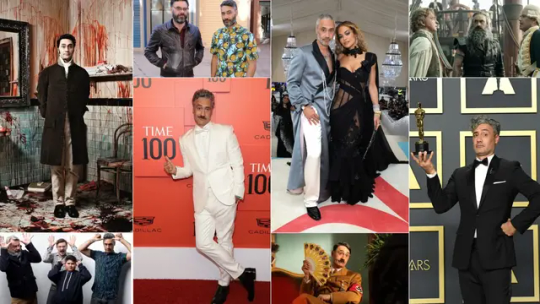
Taika Waititi: “Be a nice person and live a good life. And just don’t be an arsehole.”
The good news? Taika Waititi is still alive. I wasn’t sure. The screen we were speaking through jolted savagely a few minutes ago, with a cacophonous bang and a confused yelp, then radio silence. Now the Kiwi filmmaker is back, grinning like a loon: “I just broke the f---ing table, bro!”
Come again? “I just smashed this f---ing table and glass flew everywhere. It’s one of those old annoying colonial tables. It goes like this – see that?” Waititi says, holding up a folding furniture leg. “I hit the mechanism and it wasn’t locked. Anyway …”
I’m glad he’s fine. The stuff he’s been saying from his London hotel room could incur biblical wrath. We’re talking about his latest project, Next Goal Wins, a movie about the American Samoa soccer team’s quest to score a solitary goal, 10 years after suffering the worst loss in the game’s international history – a 31-0 ignominy to Australia – but our chat strays into spirituality, then faith, then religion.
“I don’t personally believe in a big guy sitting on a cloud judging everyone, but that’s just me,” Waititi says, deadpan. “Because I’m a grown-up.”
This is the way his interview answers often unfold. Waititi addresses your topic – dogma turns good people bad, he says, yet belief itself is worth lauding – but bookends every response with a conspiratorial nudge, wink, joke or poke. “Regardless of whether it’s some guy living on a cloud, or some other deity that you’ve made up – and they’re all made up – the message across the board is the same, and it’s important: Be a nice person, and live a good life. And just don’t be an arsehole!”
Not being an arsehole seems to have served Waititi, 48, well. Once a national treasure and indie darling (through the quirky tenderness of his breakout New Zealand films Boy in 2010 and Hunt for the Wilderpeople in 2016), Waititi then became a star of both the global box office (through his 2017 entry into the Marvel Universe, Thor: Ragnarok, which grossed more than $1.3 billion worldwide) and then the Academy Awards (winning the 2020 best adapted screenplay Oscar for his subversive Holocaust dramedy JoJo Rabbit, in which he played an imaginary Hitler).
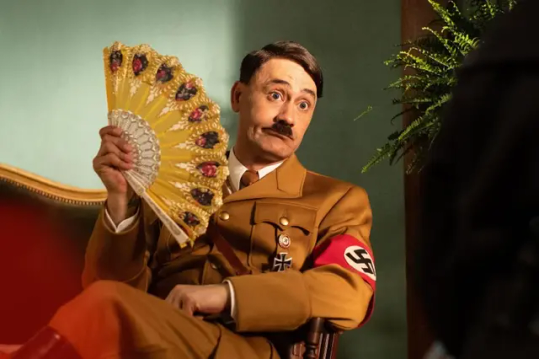
Waititi playing Adolf Hitler in the 2019 movie JoJo Rabbit. (Alamy)
A handsome devil with undeniable roguish charm, Waititi also slid seamlessly into style-icon status (attending this year’s Met Gala shirtless, in a floor-length gunmetal-grey Atelier Prabal Gurung wrap coat, with pendulous pearl necklaces), as well as becoming his own brand (releasing an eponymous line of canned coffee drinks) and bona fide Hollywood A-lister (he was introduced to his second wife, British singer Rita Ora, by actor Robert Pattinson at a barbecue).
Putting that platform to use, Waititi is an Indigenous pioneer and mentor, too, co-creating the critically acclaimed TV series Reservation Dogs, while co-founding the Piki Films production company, committed to promoting the next generation of storytellers – a mission that might sound all weighty and worthy, yet Waititi’s new wave of First Nations work is never earnest,
always mixing hurt with heart and howling humour.
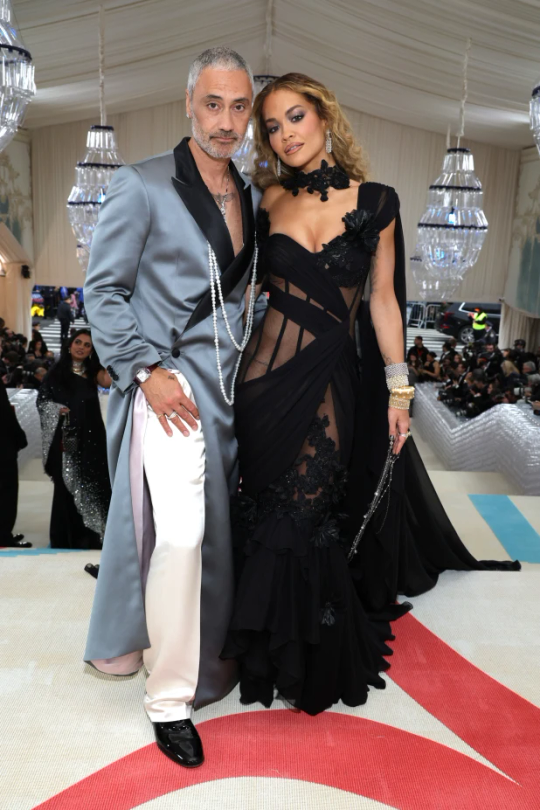
Waititi with wife Rita Ora at the 2023 Met Gala in May. (Getty Images)
Makes sense. Waititi is a byproduct of “the weirdest coupling ever” – his late Maori father from the Te Whanau-a-Apanui tribe was an artist, farmer and “Satan’s Slaves” bikie gang founder, while his Wellington schoolteacher mum descended from Russian Jews, although he’s not devout about her faith. (“No, I don’t practise,” he confirms. “I’m just good at everything, straight away.”)
He’s remained loyally tethered to his origin story, too – and to a cadre of creative Kiwi mates, including actors Jemaine Clement and Rhys Darby – never forgetting that not long before the actor/writer/producer/director was an industry maven, he was a penniless painter/photographer/ musician/comedian.
With no set title and no fixed address, he’s seemingly happy to be everything, everywhere (to everyone) all at once. “‘The universe’ is bandied around a lot these days, but I do believe in the kind of connective tissue of the universe, and the energy that – scientifically – we are made up of a bunch of atoms that are bouncing around off each other, and some of the atoms are just squished together a bit tighter than others,” he says, smiling. “We’re all made of the same stardust, and that’s pretty special.”
-----------------------------------------------
We’ve caught Waititi in a somewhat relaxed moment, right before the screen actors’ and media artists’ strike ends. He’s sensitive to the struggle but doesn’t deny enjoying the break. “I spent a lot of time thinking about writing, and not writing, and having a nice holiday,” he tells Good Weekend. “Honestly, it was a good chance just to recombobulate.”
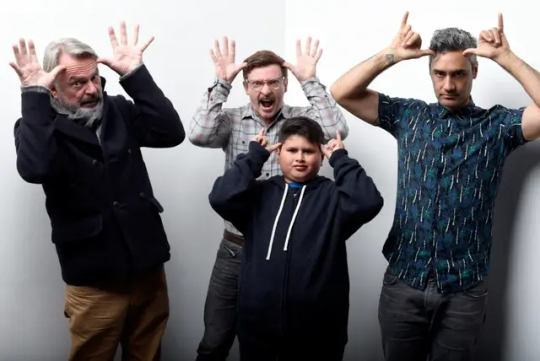
Waititi, at right, with Hunt for the Wilderpeople actors, from left, Sam Neill, Rhys Darby and Julian Dennison. (Getty Images)
It’s mid-October, and he’s just headed to Paris to watch his beloved All Blacks in the Rugby World Cup. He’s deeply obsessed with the game, and sport in general. “Humans spend all of our time knowing what’s going to happen with our day. There’s no surprises any more. We’ve become quite stagnant. And I think that’s why people love sport, because of the air of unpredictability,” he says. “It’s the last great arena entertainment.”
The main filmic touchstone for Next Goal Wins (which premieres in Australian cinemas on New Year’s Day) would be Cool Runnings (1993), the unlikely true story of a Jamaican bobsled team, but Waititi also draws from genre classics such as Any Given Sunday and Rocky, sampling trusted tropes like the musical training montage. (His best one is set to Everybody Wants to Rule the World by Tears for Fears.)
Filming in Hawaii was an uplifting experience for the self-described Polynesian Jew. “It wasn’t about death, or people being cruel to each other. Thematically, it was this simple idea, of getting a small win, and winning the game wasn’t even their goal – their goal was to get a goal,” he says. “It was a really sweet backbone.”
Waititi understands this because, growing up, he was as much an athlete as a nerd, fooling around with softball and soccer before discovering rugby league, then union. “There’s something about doing exercise when you don’t know you’re doing exercise,” he enthuses. “It’s all about the fun of throwing a ball around and trying to achieve something together.” (Whenever Waititi is in Auckland he joins his mates in a long-running weekend game of touch rugby. “And then throughout the week I work out every day. Obviously. I mean, look at me.”)
Auckland is where his kids live, too, so he spends as much time there as possible. Waititi met his first wife, producer Chelsea Winstanley, on the set of Boy in 2010, and they had two daughters, Matewa Kiritapu, 8, and his firstborn, Te Kainga O’Te Hinekahu, 11. (The latter is a derivative of his grandmother’s name, but he jokes with American friends that it means “Resurrection of Tupac” or “Mazda RX7″) Waititi and Winstanley split in about 2018, and he married the pop star Ora in 2022.
He offers a novel method for balancing work with parenthood … “Look, you just abandon them, and know that the experience will make them harder individuals later on in life. And it’s their problem,” he says. “I’m going to give them all of the things that they need, and I’m going to leave behind a decent bank account for their therapy, and they will be just like me, and the cycle will continue.”
Jokes aside – I think he’s joking – school holidays are always his, and he brings the girls onto the set of every movie he makes. “They know enough not to get in the way or touch anything that looks like it could kill you, and they know to be respectful and quiet when they need to. But they’re just very comfortable around filmmakers, which I’m really happy about, because eventually I hope they will get into the industry. One more year,” he laughs, “then they can leave school and come work for Dad.”
Theirs is certainly a different childhood than his. Growing up, he was a product of two worlds. His given names, for instance, were based on his appearance at birth: “Taika David” if he looked Maori (after his Maori grandfather) and “David Taika” if he looked Pakeha (after his white grandfather). His parents split when he was five, so he bounced between his dad’s place in Waihau Bay, where he went by the surname Waititi, and his mum, eight hours drive away in Wellington, where he went by Cohen (the last name on his birth certificate and passport).
Waititi was precocious, even charismatic. His mother Robin once told Radio New Zealand that people always wanted to know him, even as an infant: “I’d be on a bus with him, and he was that kind of baby who smiled at people, and next thing you know they’re saying, ‘Can I hold your baby?’ He’s always been a charmer to the public eye.”
He describes himself as a cool, sporty, good-looking nerd, raised on whatever pop culture screened on the two TV channels New Zealand offered in the early 1980s, from M*A*S*H and Taxi to Eddie Murphy and Michael Jackson. He was well-read, too. When punished by his mum, he would likely be forced to analyse a set of William Blake poems.
He puts on a whimpering voice to describe their finances – “We didn’t have much monneeey” – explaining how his mum spent her days in the classroom but also worked in pubs, where he would sit sipping a raspberry lemonade, doodling drawings and writing stories. She took in ironing and cleaned houses; he would help out, learning valuable lessons he imparts to his kids. “And to random people who come to my house,” he says. “I’ll say, ‘Here’s a novel idea, wash this dish,’ but people don’t know how to do anything these days.”
“Every single character I’ve ever written has been based on someone I’ve known or met or a story I’ve stolen from someone.” - Taika Waititi
He loved entertaining others, clearly, but also himself, recording little improvised radio plays on a tape deck – his own offbeat versions of ET and Indiana Jones and Star Wars. “Great free stuff where you don’t have any idea what the story is as you’re doing it,” he says. “You’re just sort of making it up and enjoying the freedom of playing god in this world where you can make people and characters do whatever you want.”
His other sphere of influence lay in Raukokore, the tiny town where his father lived. Although Boy is not autobiographical, it’s deeply personal insofar as it’s filmed in the house where he grew up, and where he lived a life similar to that portrayed in the story, surrounded by his recurring archetypes: warm grandmothers and worldly kids; staunch, stoic mums; and silly, stunted men. “Every single character I’ve ever written has been based on someone I’ve known or met,” he says, “or a story I’ve stolen from someone.”
He grew to love drawing and painting, obsessed early on with reproducing the Sistine Chapel. During a 2011 TED Talk on creativity, Waititi describes his odd subject matter, from swastikas and fawns to a picture of an old lady going for a walk … upon a sword … with Robocop. “My father was an outsider artist, even though he wouldn’t know what that meant,” Waititi told the audience in Doha. “I love the naive. I love people who can see things through an innocent viewpoint. It’s inspiring.”
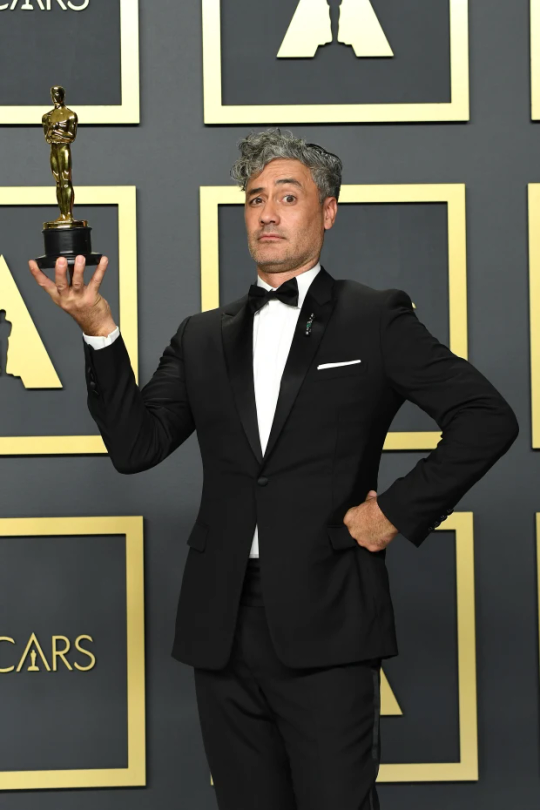
After winning Best Adapted Screenplay Academy Award for JoJo Rabbit in 2020. (Getty Images)
It was an interesting time in New Zealand, too – a coming-of-age decade in which the Maori were rediscovering their culture. His area was poor, “but only financially,” he says. “It’s very rich in terms of the people and the culture.” He learned kapa haka – the songs, dances and chants performed by competing tribes at cultural events, or to honour people at funerals and graduations – weddings, parties, anything. “Man, any excuse,” he explains. “A big part of doing them is to uplift your spirits.”
Photography was a passion, so I ask what he shot. “Just my penis. I sent them to people, but we didn’t have phones, so I would print them out, post them. One of the first dick pics,” he says. Actually, his lens was trained on regular people. He watches us still – in airports, restaurants. “Other times late at night, from a tree. Whatever it takes to get the story. You know that.”
He went to the Wellington state school Onslow College and did plays like Androcles and the Lion, A Midsummer Night’s Dream and The Crucible. His crew of arty students eventually ended up on stage at Bats Theatre in the city, where they would perform haphazard comedy shows for years.
“Taika was always rebellious and wild in his comedy, which I loved,” says his high school mate Jackie van Beek, who became a longtime collaborator, including working with Waititi on a Tourism New Zealand campaign this year. “I remember he went through a phase of turning up in bars around town wearing wigs, and you’d try and sit down and have a drink with him but he’d be doing some weird character that would invariably turn up in some show down the track.”
He met more like-minded peers at Victoria University, including Jemaine Clement (who’d later become co-creator of Flight of the Conchords). During a 2019 chat with actor Elijah Wood, Waititi describes he and Clement clocking one another from opposite sides of the library one day: a pair of Maoris experiencing hate at first sight, based on a mutual suspicion of cultural appropriation. (Clement was wearing a traditional tapa cloth Samoan shirt, and Waititi was like: “This motherf---er’s not Samoan.” Meanwhile, Waititi was wearing a Rastafarian beanie, and Clement was like, “This motherf---er’s not Jamaican.”)
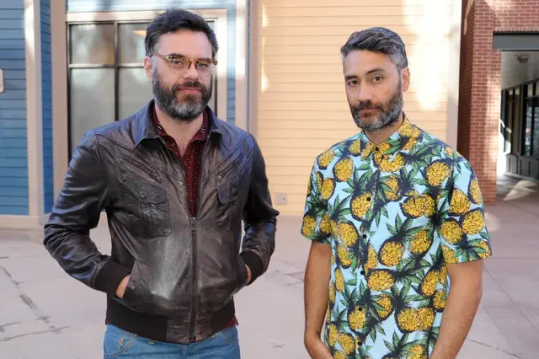
With Jemaine Clement in 2014. (Getty Images)
But they eventually bonded over Blackadder and Fawlty Towers, and especially Kenny Everett, and did comedy shows together everywhere from Edinburgh to Melbourne. Waititi was almost itinerant, spending months at a time busking, or living in a commune in Berlin. He acted in a few small films, and then – while playing a stripper on a bad TV show – realised he wanted to try life behind the camera. “I became tired of being told what to do and ordered around,” he told Wellington’s Dominion Post in 2004. “I remember sitting around in the green room in my G-string thinking, ‘Why am I doing this? Just helping someone else to realise their dream.’ ”
He did two strong short films, then directed his first feature – Eagle vs Shark (2007) – when he was 32. He brought his mates along (Clement, starring with Waititi’s then-girlfriend Loren Horsley), setting something of a pattern in his career: hiring friends instead of constantly navigating new working relationships. “If you look at things I’m doing,” he tells me, “there’s always a few common denominators.”
Sam Neill says Waititi is the exemplar of a new New Zealand humour. “The basis of it is this: we’re just a little bit crap at things.”
This gang of collaborators shares a common Kiwi vibe, too, which his longtime friend, actor Rhys Darby, once coined “the comedy of the mundane”. Their new TV show, Our Flag Means Death, for example, leans heavily into the mundanity of pirate life – what happens on those long days at sea when the crew aren’t unsheathing swords from scabbards or burying treasure.
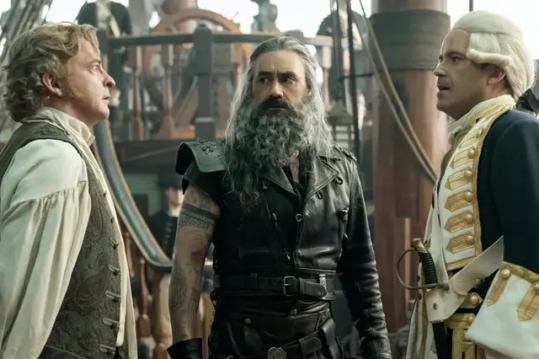
Waititi plays pirate captain Blackbeard, centre, in Our Flag Means Death, with Rhys Darby, left, and Rory Kinnear. (Google Images)
Sam Neill, who first met Waititi when starring in Hunt for the Wilderpeople, says Waititi is the exemplar of a new New Zealand humour. “And I think the basis of it is this,” says Neill. “We’re just a little bit crap at things, and that in itself is funny.” After all, Neill asks, what is What We Do in The Shadows (2014) if not a film (then later a TV show) about a bunch of vampires who are pretty crap at being vampires, living in a pretty crappy house, not quite getting busted by crappy local cops? “New Zealand often gets named as the least corrupt country in the world, and I think it’s just that we would be pretty crap at being corrupt,” Neill says. “We don’t have the capacity for it.”
Waititi’s whimsy also spurns the dominant on-screen oeuvre of his homeland – the so-called “cinema of unease” exemplified by the brutality of Once Were Warriors (1994) and the emotional peril of The Piano (1993). Waititi still explores pathos and pain, but through laughter and weirdness. “Taika feels to me like an antidote to that dark aspect, and a gift somehow,” Neill says. “And I’m grateful for that.”
-----------------------------------------------
Something happened to Taika Waititi when he was about 11 – something he doesn’t go into with Good Weekend, but which he considered a betrayal by the adults in his life. He mentioned it only recently – not the moment itself, but the lesson he learnt: “That you cannot and must not rely on grown-ups to help you – you’re basically in the world alone, and you’re gonna die alone, and you’ve just gotta make it all for yourself,” he told Irish podcast host James Brown. “I basically never forgave people in positions of responsibility.”
What does that mean in his work? First, his finest films tend to reflect the clarity of mind possessed by children, and the unseen worlds they create – fantasies conjured up as a way to understand or overcome. (His mum once summed up the main message of Boy: “The unconditional love you get from your children, and how many of us waste that, and don’t know what we’ve got.”)
Second, he’s suited to movie-making – “Russian roulette with art” – because he’s drawn to disruptive force and chaos. And that in turn produces creative defiance: allowing him to reinvigorate the Marvel Universe by making superheroes fallible, or tell a Holocaust story by making fun of Hitler. “Whenever I have to deal with someone who’s a boss, or in charge, I challenge them,” he told Brown, “and I really do take whatever they say with a pinch of salt.”
It’s no surprise then that Waititi was comfortable leaping from independent films to the vast complexity of Hollywood blockbusters. He loves the challenge of coordinating a thousand interlocking parts, requiring an army of experts in vocations as diverse as construction, sound, art, performance and logistics. “I delegate a lot,” he says, “and share the load with a lot of people.”
“This is a cool concept, being able to afford whatever I want, as opposed to sleeping on couches until I was 35.” - Taika Waititi
But the buck stops with him. Time magazine named Waititi one of its Most Influential 100 People of 2022. “You can tell that a film was made by Taika Waititi the same way you can tell a piece was painted by Picasso,” wrote Sacha Baron Cohen. Compassionate but comic. Satirical but watchable. Rockstar but auteur. “Actually, sorry, but this guy’s really starting to piss me off,” Cohen concluded. “Can someone else write this piece?”
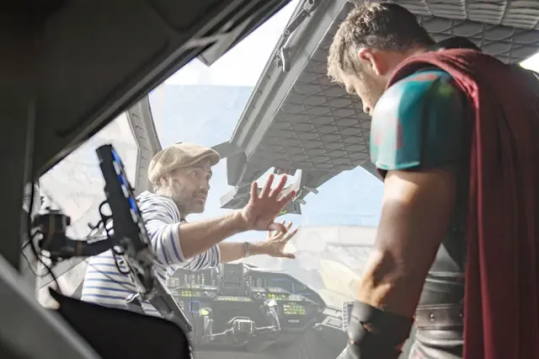
Directing Chris Hemsworth in 2017 in Thor: Ragnarok, which grossed more than $1.3 billion at the box office. (Alamy)
I’m curious to know how he stays grounded amid such adulation. Coming into the game late, he says, helped immensely. After all, Waititi was 40 by the time he left New Zealand to do Thor: Ragnarok. “If you let things go to your head, then it means you’ve struggled to find out who you are,” he says. “But I’ve always felt very comfortable with who I am.” Hollywood access and acclaim – and the pay cheques – don’t erase memories of poverty, either. “It’s more like, ‘Oh, this is a cool concept, being able to afford whatever I want, as opposed to sleeping on couches until I was 35.’ ” Small towns and strong tribes keep him in check, too. “You know you can’t piss around and be a fool, because you’re going to embarrass your family,” he says. “Hasn’t stopped me, though.”
Sam Neill says there was never any doubt Waititi would be able to steer a major movie with energy and imagination. “It’s no accident that the whole world wants Taika,” he says. “But his seductiveness comes with its own dangers. You can spread yourself a bit thin. The temptation will be to do more, more, more. That’ll be interesting to watch.”
Indeed, I find myself vicariously stressed out over the list of potential projects in Waititi’s future. A Roald Dahl animated series for Netflix. An Apple TV show based on the 1981 film Time Bandits. A sequel to What We Do In The Shadows. A reboot of Flash Gordon. A gonzo horror comedy, The Auteur, starring Jude Law. Adapting a cult graphic novel, The Incal, as a feature. A streaming series based on the novel Interior Chinatown. A film based on a Kazuo Ishiguro bestseller. Plus bringing to life the wildly popular Akira comic books. Oh, and for good measure, a new instalment of Star Wars, which he’s already warned the world will be … different.
“It’s going to change things,” he told Good Morning America. “It’s going to change what you guys know and expect.”
Did I say I was stressed for Waititi? I meant physically sick.
“Well…” he qualifies, “some of those things I’m just producing, so I come up with an idea or someone comes to me with an idea, and I shape how ‘it’s this kind of show’ and ‘here’s how we can get it made.’ It’s easier for me to have a part in those things and feel like I’ve had a meaningful role in the creative process, but also not having to do what I’ve always done, which is trying to control everything.”
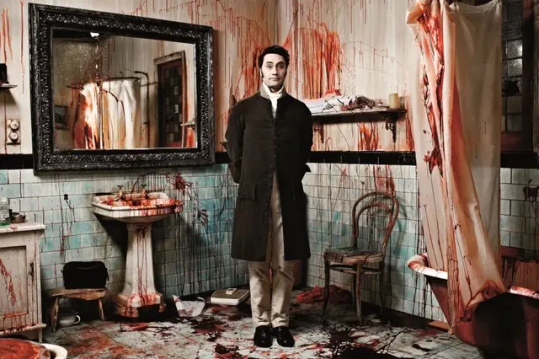
In the 2014 mockumentary horror film What We Do in the Shadows, which he co-directed with Jemaine Clement. (Alamy)
What about moving away from the niche New Zealand settings he represented so well in his early work? How does he stay connected to his roots? “I think you just need to know where you’re from,” he says, “and just don’t forget that.”
They certainly haven’t forgotten him.
Jasmin McSweeney sits in her office at the New Zealand Film Commission in Wellington, surrounded by promotional posters Waititi signed for her two decades ago, when she was tasked with promoting his nascent talent. Now the organisation’s marketing chief, she talks to me after visiting the heart of thriving “Wellywood”, overseeing the traditional karakia prayer on the set of a new movie starring Geoffrey Rush.
Waititi isn’t the first great Kiwi filmmaker – dual Oscar-winner Jane Campion and blockbuster king Peter Jackson come to mind – yet his particular ascendance, she says, has spurred unparalleled enthusiasm. “Taika gave everyone here confidence. He always says, ‘Don’t sit around waiting for people to say, you can do this.’ Just do it, because he just did it. That’s the Taika effect.”
-----------------------------------------------
Taika David Waititi is known for wearing everything from technicolour dreamcoats to pineapple print rompers, and today he’s wearing a roomy teal and white Isabel Marant jumper. The mohair garment has the same wispy frizz as his hair, which curls like a wave of grey steel wool, and connects with a shorn salty beard.
A stylish silver fox, it wouldn’t surprise anyone if he suddenly announced he was launching a fashion label. He’s definitely a commercial animal, to the point of directing television commercials for Coke and Amazon, along with a fabulous 2023 spot for Belvedere vodka starring Daniel Craig. He also joined forces with a beverage company in Finland (where “taika” means “magic”) to release his coffee drinks. Announcing the partnership on social media, he flagged that he would be doing more of this kind of stuff, too (“Soz not soz”).
Waititi has long been sick of reverent portrayals of Indigenous people talking to spirits.
There’s substance behind the swank. Fashion is a creative outlet but he’s also bought sewing machines in the past with the intention of designing and making clothes, and comes from a family of tailors. “I learnt how to sew a button on when I was very young,” he says. “I learnt how to fix holes or patches in your clothes, and darn things.”
And while he gallivants around the globe watching Wimbledon or modelling for Hermès at New York Fashion Week, all that glamour belies a depth of purpose, particularly when it comes to Indigenous representation.
There’s a moment in his new movie where a Samoan player realises that their Dutch coach, played by Michael Fassbender, is emotionally struggling, and he offers a lament for white people: “They need us.” I can’t help but think Waititi meant something more by that line – maybe that First Nations people have wisdom to offer if others will just listen?
“Weeelllll, a little bit …” he says – but from his intonation, and what he says next, I’m dead wrong. Waititi has long been sick of reverent portrayals of Indigenous people talking to kehua (spirits), or riding a ghost waka (phantom canoe), or playing a flute on a mountain. “Always the boring characters,” he says. “They’ve got no real contemporary relationship with the world, because they’re always living in the past in their spiritual ways.”

A scene from Next Goal Wins, filmed earlier this year. (Alamy)
He’s part of a vanguard consciously poking fun at those stereotypes. Another is the Navajo writer and director Billy Luther, who met Waititi at Sundance Film Festival back in 2003, along with Reservation Dogs co-creator Sterlin Harjo. “We were this group of outsiders trying to make films, when nobody was really biting,” says Luther. “It was a different time. The really cool thing about it now is we’re all working. We persevered. We didn’t give up. We slept on each other’s couches and hung out. It’s like family.”
Waititi has power now, and is known for using Indigenous interns wherever possible (“because there weren’t those opportunities when I was growing up”), making important introductions, offering feedback on scripts, and lending his name to projects through executive producer credits, too, which he did for Luther’s new feature film, Frybread Face and Me (2023).
He called Luther back from the set of Thor: Love and Thunder (2022) to offer advice on working with child actors – “Don’t box them into the characters you’ve created,” he said, “let them naturally figure it out on their own” – but it’s definitely harder to get Waititi on the phone these days. “He’s a little bitch,” Luther says, laughing. “Nah, there’s nothing like him. He’s a genius. You just knew he was going to be something. I just knew it. He’s my brother.“
I’ve been asked to explicitly avoid political questions in this interview, probably because Waititi tends to back so many causes, from child poverty and teenage suicide to a campaign protesting offshore gas and oil exploration near his tribal lands. But it’s hard to ignore his recent Instagram post, sharing a viral video about the Voice to Parliament referendum starring Indigenous Aussie rapper Adam Briggs. After all, we speak only two days after the proposal is defeated. “Yeah, sad to say but, Australia, you really shat the bed on that one,” Waititi says, pausing. “But go see my movie!”
About that movie – the early reviews aren’t great. IndieWire called it a misfire, too wrapped in its quirks to develop its arcs, with Waititi’s directorial voice drowning out his characters, while The Guardian called it “a shoddily made and strikingly unfunny attempt to tell an interesting story in an uninteresting way”. I want to know how he moves past that kind of criticism. “For a start, I never read reviews,” he says, concerned only with the opinion of people who paid for admission, never professional appraisals. “It’s not important to me. I know I’m good at what I do.”
Criticism that Indigenous concepts weren’t sufficiently explained in Next Goal Wins gets his back up a little, though. The film’s protagonist, Jaiyah Saelua, the first transgender football player in a FIFA World Cup qualifying match, is fa’afafine – an American Samoan identifier for someone with fluid genders – but there wasn’t much exposition of this concept in the film. “That’s not my job,” Waititi says. “It’s not a movie where I have to explain every facet of Samoan culture to an audience. Our job is to retain our culture, and present a story that’s inherently Polynesian, and if you don’t like it, you can go and watch any number of those other movies out there, 99 per cent of which are terrible.”
*notes: (there is video clip in the article)
Waititi sounds momentarily cranky, but he’s mostly unflappable and hilarious. He’s the kind of guy who prefers “Correctumundo bro!” to “Yes”. When our video connection is too laggy, he plays up to it by periodically pretending to be frozen, sitting perfectly still, mouth open, his big shifting eyeballs the only giveaway.
He’s at his best on set. Saelua sat next to him in Honolulu while filming the joyous soccer sequences. “He’s so chill. He just let the actors do their thing, giving them creative freedom, barely interjecting unless it was something important. His style matches the vibe of the Pacific people. We’re a very funny people. We like to laugh. He just fit perfectly.”
People do seem to love working alongside him, citing his ability to make productions fresh and unpredictable and funny. Chris Hemsworth once said that Waititi’s favourite gag is to “forget” that his microphone is switched on, so he can go on a pantomime rant for all to hear – usually about his disastrous Australian lead actor – only to “remember” that he’s wired and the whole crew is listening.
“I wouldn’t know about that, because I don’t listen to what other people say about anything – I’ve told you this,” Waititi says. “I just try to have fun when there’s time to have fun. And when you do that, and you bring people together, they’re more willing to go the extra mile for you, and they’re more willing to believe in the thing that you’re trying to do.”
Yes, he plays music between takes, and dances out of his director’s chair, but it’s really all about relaxing amid the immense pressure and intense privilege of making movies. “Do you know how hard it is just to get anything financed or green-lit, then getting a crew, getting producers to put all the pieces together, and then making it to set?” Waititi asks. “It’s a real gift, even to be working, and I feel like I have to remind people of that: enjoy this moment.”
Source: The Age
By: Konrad Marshall (December 1, 2023)
194 notes
·
View notes
Text
Harry Styles ‘Love on Tour’ Ends After 173 Concerts for 5.04 Million Fans, and $6.5 Million Donated to Charity
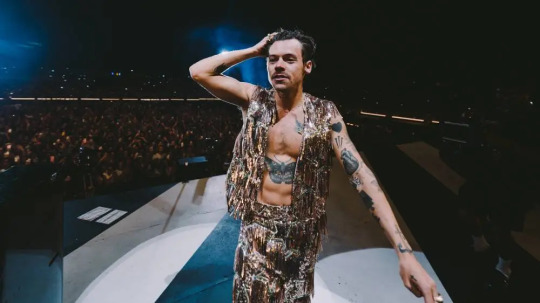
Harry Styles’ world-shaking “Love on Tour” wrapped before a crowd of 100,000 people at Italy’s RCF Arena last week, concluding 173 dates over nearly three years. The tour launched on September 4, 2021 and saw Styles performing to 5.04 million fans in North and South America, the U.K., Europe and Australia — including 20 dates at Madison Square Garden, 18 at the Los Angeles Forum, six at London’s Wembley Stadium, and two sets of “Harryween” concerts — and is the fourth highest-grossing tour of all time, according to the announcement.
Just as significantly, the tour donated some $6.5 million to charities, which are listed below.
He was joined for the tour by a band that features Pauli Lovejoy, Sarah Jones, Mitch Rowland, Madi Diaz, Elin Sandberg, Ariza, Yaffra, Parris Fleming, Kailah Vandever, Lorren Chiodo and Laura Bibbs.
The tour also saw the release of Styles’ third solo album, “Harry’s House,” which won Grammy Awards for album of the year and best pop vocal album, as well as all four BRIT Awards for which it was nominated. The album’s head single, “As It Was,” reached No. 1 in 33 countries—including 15 weeks on top of the Billboard Hot 100.
CHARITIES DONATED TO ON LOVE ON TOUR
Planned Parenthood
Choose Love
Physicians for Reproductive Health
Rebuild Foundation
REVERB
Black Voters Matter Fund – Capacity Building Institute
The Afiya Center
International Rescue Committee
Intermission Youth
Save the Children
CARE
Every Town for Gun Safety
BEAM
Theater Gates
Rebuild Theater – Venice Program
WWWF-Brasil
Sydney Zoo
Baan Tawan Mai Orphans (Pow Sarin Org)
Cribs Foundation Inc.
St John’s Home
Limitless
Children’s Wishing Well
SHINE
Green Umbrella Children’s Foundation
Black Minds
Florence Org… “and more.”
Via variety.com
342 notes
·
View notes
Text
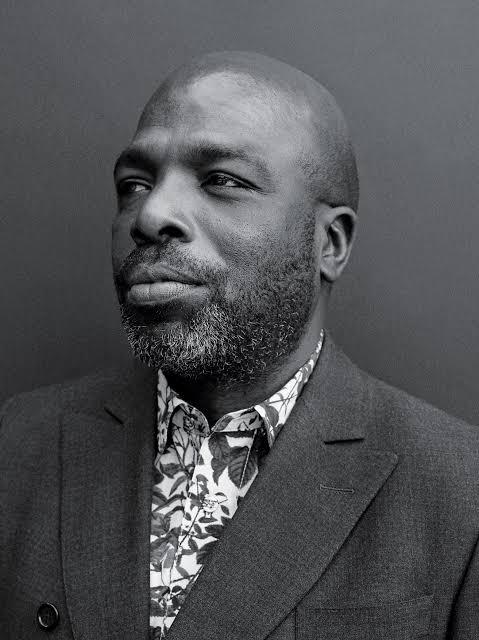
Duro Olowu
Olowu was born in Lagos, Nigeria, to a Jamaican mother and Nigerian father.He grew up in Lagos, spending summers in Europe and immersing himself in multiple cultures.
He moved to the United Kingdom when he was 16 , and like his father before him, Olowu studied law in England and later returned to Nigeria.
He soon gave up a legal career and moved back to London to pursue his true vocation as a self taught fashion designer, first designing womenswear collections for the now defunct London based label Olowu Golding.
In 2004, Olowu launched his women's wear label, beginning with a Spring/Summer 2005 collection, his womenswear label is known for its innovative combinations of colors and patterns, harmonious juxtapositions of vintage textiles with custom fabrics, and impeccably tailored silhouettes.
Olowu’s aesthetic vision is informed by his multicultural and international background, art, and other creative practices.
An empire-waist multi print silk dress from his debut collection, discovered by American Vogue editor Sally Singer, became an international hit. Selling out in renowned stores in New York, London and Chicago
In 2005, Olowu won the New Designer of the Year Award at the British Fashion Awards. The only designer to do so prior to their first catwalk show.
In 2009 he was named the Best International Designer at the African Fashion Award
In recent years, Olowu also began curating contemporary art exhibitions in galleries and museums beginning with his highly praised exhibitions, "Material" (2012) and "More Material (2014) at Salon94 gallery in New York.
His first museum exhibition was 2016, the critically acclaimed, "Making & Unmaking" at the Camden Arts Centre in London.
In early 2020, Olowu curated his second museum exhibition,"Duro Olowu: Seeing Chicago" at The Museum of Contemporary Art, Chicago
63 notes
·
View notes
Text
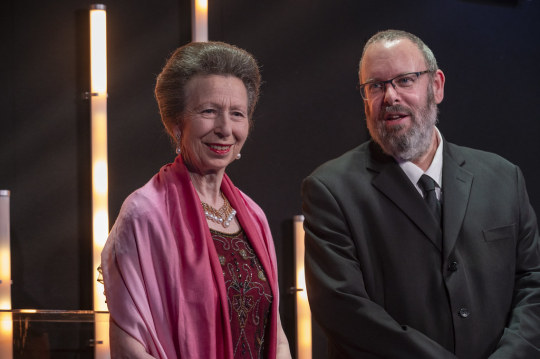
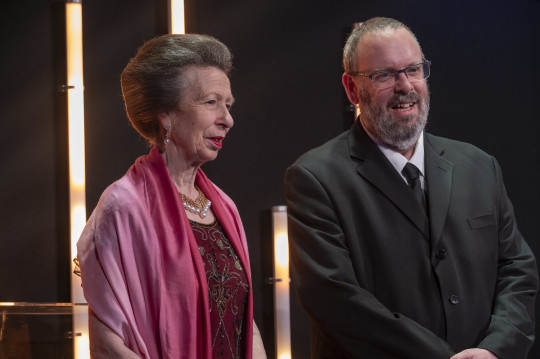
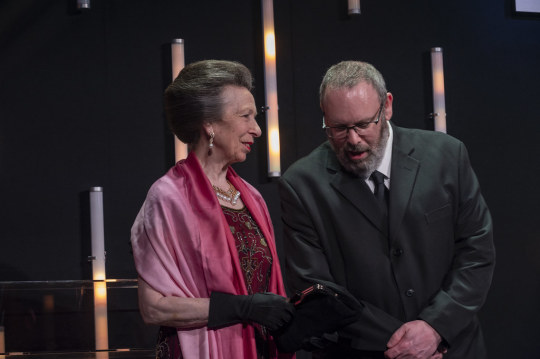
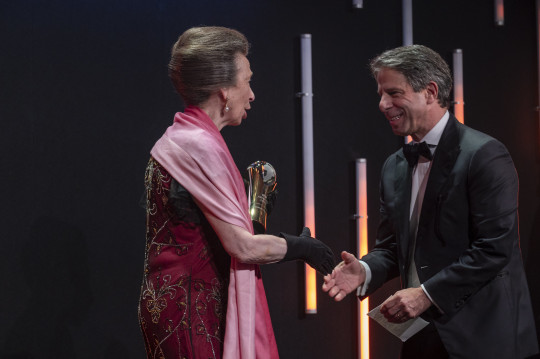
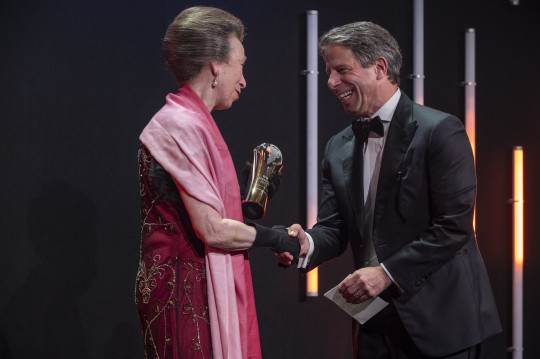
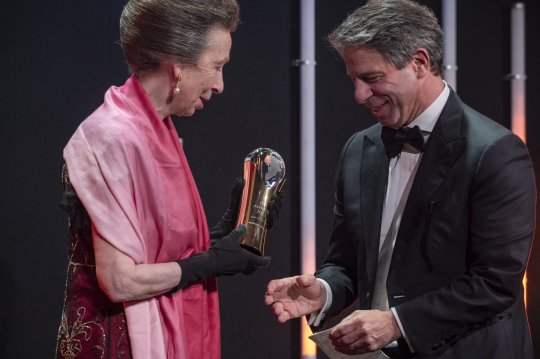
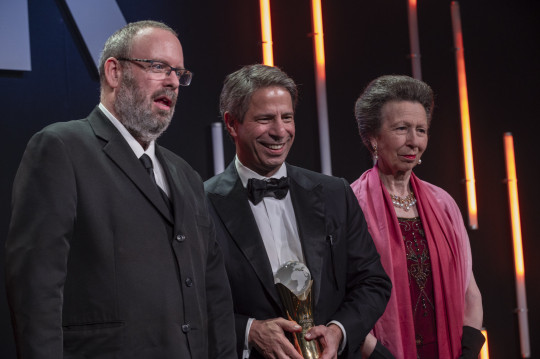
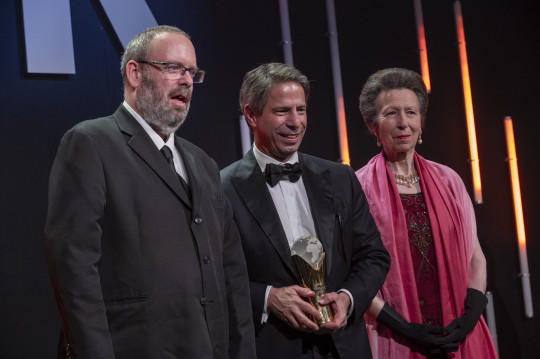
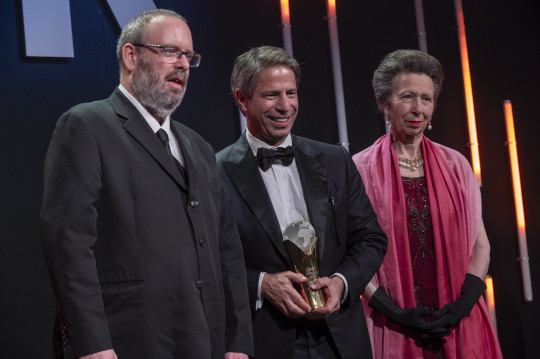
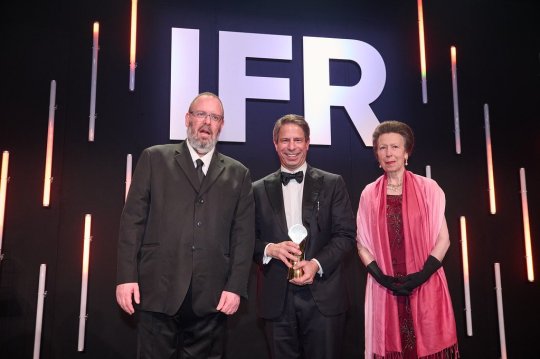
Princess Anne, as Patron of the Save the Children UK, attended the International Financial Review Annual Awards Dinner at the Grosvenor House Hotel, Park Lane, London, on 18 March 2024.
#AAAAAH#LOOK AT HER#LOOK AT MY PRINCESS#😭😭😭#SHE'S SO PRETTY#SHE'S SO BEAUTIFUL#SHE FINALLY PUT ON SOME MASCARA I CAN'T BELIEVE IT 😭😭😭#KILLING THE RED LIPSTICK#HER HAIR LOOKS SO SOFT#THE COULOUR LOOKING SO FAB ON HER#SHE LOOKS FAB#I CAAAAAAN'T#pretty princess#smiley princess#ALSO THAT'S A NEW DRESS!!!#princess anne#princess royal#workanne#brf#british royal family
74 notes
·
View notes
Text
essence in the air // letitia wright
summary: interviewer!reader. it seems there’s a lot of underlying chemistry between you and your interviewee, Letitia Wright
a/n: saw clips of tish flirting w interviewers and here we are. i included a lil piece inspired by @drletitiawright and @aaliyg talking about a Dr kink 😏
warnings: just fluff. flirty reader and flustered tish. reader is from the Dominican Republic and speaks Spanish (very minimal)
✧
you exhale softly as you get last minute touch ups to hair and makeup. you glance across from you to look at your interviewee—Letitia Wright. she was dressed in a off white hoodie with matching sweats, a black jacket, and air forces, scrolling on her phone while her glasses reflect the bright screen.
you were very excited for this interview. you had gotten great reviews from many stars and prided yourself on having laidback, fun sessions with all guests for Essence Magazine. from Lashana Lynch to Keke Palmer, your issue of celebrity interviews in the magazine and on their channel had been something viewers looked forward to, which was very beneficial for your paycheck.
she looks up, catching your gaze as she offers a smile. you return the gesture, crossing your legs in the lounge chair. “you ready?” you ask as the cosmetologists left.
she inhales sharply, “yep, though i wish you’d told me about the dress code,” she says, eyeing your exposed legs from the slit in your dress. “i would’ve come in something nicer.”
“girl, you’d look good in a trash bag. besides, the whole point of this is for you to have fun and be comfortable. as long as that’s happening, you’re good.”
“says the one wearing a body con dress,” she says as you wave a hand at her. “you go out in designer everyday, you’ll be good for 30 minutes, hon.” she laughs, humming in agreement.
the tech guy comes in, cueing you as the cameraman starting rolling.
“hey guys, I’m y/n y/l/n with Essence Magazine, and today i’m here with esteemed movie star, devoted Christian, and—as of recent weeks— doctor in arts and letters, miss letitia wright. how you doing, angel?”
a smile dances across her face, eyes surely lighting up behind her black sunglasses. “wow, what an introduction. thank you. i-i’m well, how are you?”
“great, thank you,” you begin. “so, tell me a little about how you earned your doctorate, what’s it in, and what it means to you?”
she sighs briefly, “man, it’s um, it’s definitely an honor, such a blessing to even be considered for something like that. it’s in arts and letters, as you said, and to have it come from a school in my home country, Guyana, made it that much more…moving for me. i’ve been acting since I was a teenager and never dreamed of any of this happening.” she said, gesturing around us with her hands. “from small projects in London to…”
“being an international award-winning actress?”
“yes! it’s all a lot, but being recognized for my work is-is great.” she finishes.
“do any of your friends or family use the title or is it just a formality?”
“nah, after i got it some did as a lil joke but for the most part I’m same ol tish.”
so, can I call you doctor?” you tease.
she laughs lightly, shaking her head. though her words contradict her as she replies. “i-i suppose so, yeah, yeah you can.”
“dr. wright.” you said. “has nice ring to it. though mrs. wright wouldn’t sound too bad either.”
her laughter was fuller this time. “bad. you are bad.”
you shrug lightly, a knowing smile on your face.
“but in all seriousness, it’s nice to see representation for Afro Caribbeans out here. being an inspiration for so many across the world, and a role model for young people everywhere to see someone who looks like them, who comes from a place like them, on screen. we don’t see enough of us gettin’ our flowers. I’m glad you are.”
she nods humbly. “you Caribbean? stop playin, what part?”
“la República Dominicana, act like you know,” you said smiling. She hummed in admiration. “oh, the accent, ok I see you. you speak any Spanish?”
“eres muy hermosa y tienes mucho talento.”
you’re very beautiful and have so much talent.
you say the short sentence to her, none of which she understands, yet she leaned forward to rest her elbows on her knees as she listened. “i don’t know what you said, but it sounded hella good,” she smiles.
you shook head as you laughed. “man, you something else,” you said as you looked at her again, to which she put her hands up in defense.
“speaking of accents, in a lot of your productions you’re seen using your regular British accent, as well as those from various parts of Africa.”
“mmhm.”
“yet, we rarely hear you with an american accent onscreen. can you give me your best american accent right now?”
“right now?” she asks, pointing down.
“right now, go.”
she shakes her shoulders out before turning to the camera. “hey y’all, i’m letitia wright here with Essence Magazine,” she says in the absolute worst attempt of a southern accent you’ve ever heard.
your eyes go wide before you bust out laughing, shaking your head. “come on, now. don’t do me like that,” she says, a shy smile on her face.
“i’m sorry, i’m sorry,” you begin as you calm yourself. “it’s just refreshing to know there’s something you’re not good at.”
“i haven’t had any roles that require an american accent yet, so there’s time to perfect it.” you nod in agreement.
“so for the real question of the hour,” you say as she leans back in her seat, waiting for you to continue. “why you always got them glasses on?”
she smacks her teeth, trying—and failing—to suppress the smirk that grows on her face. “man, i thought we were gonna get deep.”
“oh, we can get deep, angel. i mean, why hide the eyes? the windows to the soul. i bet you have a beautiful soul, yet the entire time you’ve been here i haven’t got to see for myself.”
“my eyes or my soul?” she asks, tilting her head back.
you open your mouth to respond, yet can’t find the words. you begin to smile as she points at you. “ahh, i got you there, huh?” she says, grills glowing under the studio lights.
you roll your eyes as you reply. “alright, alright. don’t let it happen again.”
“my bad, baby girl. here,” she says, reaching up to take off her shades. “to make it up to you.” she sets them down on the small glass table between you.
“aw, thank you, dr. wright.” you say, thankful for the gift of melanin, and blush applied previously, that the heat rising to your face isn’t visible.
“so?”
“so…”
“my eyes…do they live up to your expectations?”
you lean forward, not missing the way her eyes drop to your cleavage as she does the same. you pause to really look at her, defined jawline, toned skin, fresh haircut, before going back up to her eyes.
“they are…subpar.” you say, swiping her glasses from the table as you slide them over your eyes.
“wow,” she says, bringing a hand to her heart as she leaned back. “it’s like that?”
you wave her off. “i’m just teasing, relax,” you assure as she mumbles, “yeah, ok.”
with the glasses off, you can really feel her gaze on you, though luckily part of yours is hidden this time.
“now look who’s hiding,” she comments, nodding her chin up at you.
“a nice change of pace. i think i look good, right? real official.”
she laughs before she responds. “yeah, you look good.”
you smile as you take them off, putting them on the neckline of your dress.
“so, can I count on seeing you at Essence Fest?” you ask with a sickeningly sweet smile, one that prevents her from answering with anything other than yes. “yeah, yeah you’ll see me there.” she replies while nodding with a smile.
you turn to the cameraman, “ok, i think we’re good!” you turn back to her, “thanks again for coming! it’s been a joy to have you.”
“thank you for having me. truly one of the best interviews i’ve had in a long time.”
“just doing my job, angel.”
she shakes her head, looking at the floor. “of course, of course. would you mind if we have a picture?”
“not at all,” you say, going to sit on the arm of her chair. you do a few sitting, her signature smize and a couple hand motions. you both get up to do standing shots, some with her hands clasped in front of her and others with her arm around your middle.
once you’re done she pulls you in for a hug. your hands slide up her shoulder blades as hers find their way around your waist once more. she gives you a caring squeeze which you reciprocate. you feel pressure between your chests which makes you pull away as you realize. “oh! don’t forget your glasses,” you pull them from the hem of your dress, extending a hand towards her.
“please, keep ‘em,” she assures, giving you one last smile—small yet warm—before heading out.
“bye, doctor!” you call as she leaves.
she turns around, walking backwards with her hands in her pockets. “see you soon.”
-
you packed up for the day, locking up your office and the main studio. walking out the building, your stride pauses as you feel your phone buzz in you purse. you pull it out to see a notification from instagram.
letitiawright started following you
you smiled at the message, seeing you missed two others from a couple hours ago.
letitawright mentioned you on their story
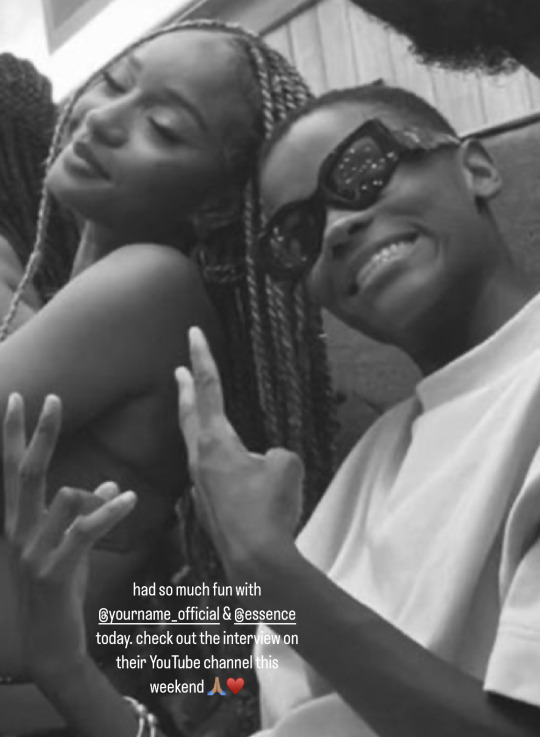
letitawright tagged you in a post
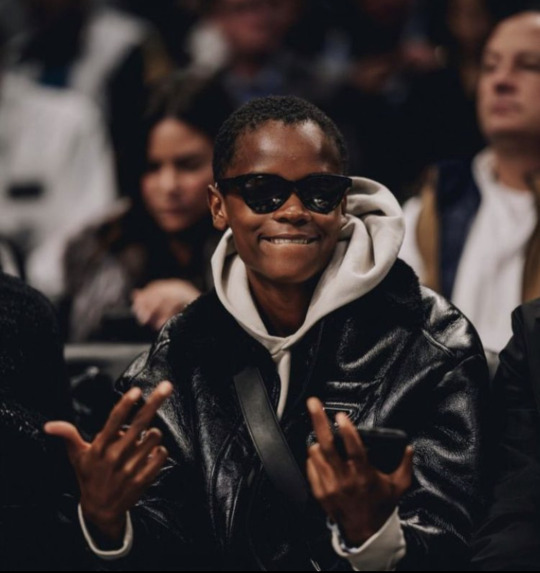
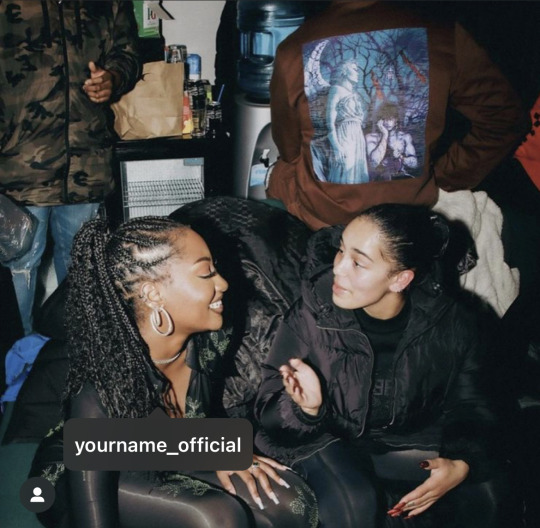
liked by essence, danaigurira, and others
letitiawright new issue of @essence for the March 2023 issue. You can watch the interview on their channel and see the wonderful photos this spring✨
koffee 😍🖤
load comments
✧
a/n: best believe she looked up whatever the hell you said and blushed
#naomis-daydreams#letitia wright#letitia wright x reader#black panther#letitia x black!fem!reader#letitia x black!reader#letitia wright shuri#dr. letitia wright
538 notes
·
View notes
Photo









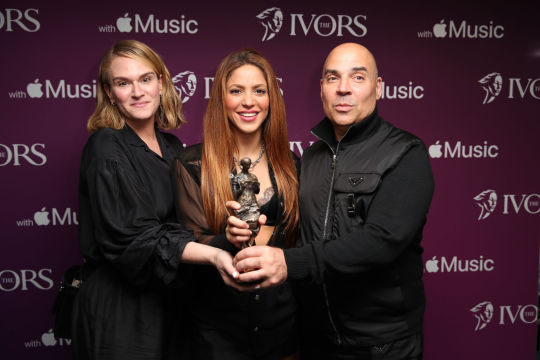
New photos of Shakira posing with her Special International Award at The Ivor Novello Awards 2022 at The Grosvenor House Hotel in London, England. (May 19, 2022)
#shakira#shakira mebarak#celebs#celebrities#the ivor novello awards 2022#special international award#the grosnever house hotel#london#england#new photos#photos#may 2022
11 notes
·
View notes
Text
The Castells - Some Enchanted Evening
1963
"Some Enchanted Evening" is a show tune from the 1949 Rodgers and Hammerstein musical South Pacific. The song is a three-verse solo for the leading male character, Emile, in which he describes first seeing a stranger, knowing that he will see her again, and dreaming of her laughter. In the original Broadway production, "Some Enchanted Evening" was sung by former Metropolitan Opera star Ezio Pinza. Pinza won the Tony Award for Best Actor in 1950 for this role, and the song made him a favorite with audiences and listeners who normally did not attend or listen to opera. In the 2001 London revival of the show, Philip Quast won an Olivier Award for Best Actor for his role as Emile, and seven years later, international opera singer Paulo Szot won a Tony for his portrayal in the 2008 New York revival.
The Castells were a male vocal quartet from Santa Rosa, California, best remembered for their hits "Sacred" (number 20 on the Billboard chart in 1961) and "So This Is Love" (number 21 in 1962). Their sound blended light rock with elements of collegiate vocal harmony and jazz.
Their version of "Some Enchanted Evening" was used twice in the first episode of the Fallout tv series; at Lucy's wedding dance and during the raider massacre in Vault 33. It is also included on the official Amazon Music playlist "Music from Fallout" promoting the series.
"Some Enchanted Evening"received a total of 62,4% yes votes!
youtube
461 notes
·
View notes
Text
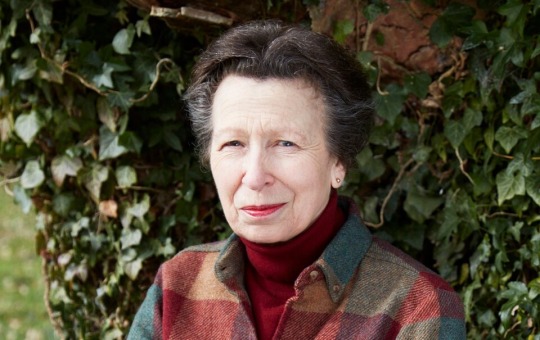
The Princess Royal interview: ‘I’m not sure that rewilding at scale is necessarily a good idea’
With conservation close to her heart, HRH explains what’s needed to save animals under threat and how the monarchy plays its part
By Jessamy Calkin for The Telegraph
Inside St James’s Palace there is a bit of a flutter about the weather. Her Royal Highness the Princess Royal has several engagements today, and things are not looking good; due to wind, the helicopter might not be able to land at the designated sites, which will make travelling times to and from events longer.
The staff are waiting to be informed by the police, who are in touch with the helicopter pilot. HRH, as everyone seems to call her, has not yet been told.
She has a lot to fit in: directly after our interview, she is off to a meeting about Gordonstoun school, in London, by car, then by helicopter to give a speech at an English Rural Housing Association conference in Bedfordshire, followed by a visit to the Aircraft Research Association, where she will unveil a plaque, then back to St James’s Palace to change for evensong at The King’s Chapel of the Savoy, where she will be reading the lesson for the Royal Victorian Order.
Her day will finish at about nine, when she will be able to eat. Quite often she has a dinner engagement as well. Next week she is going to Mumbai for four days.
Not for nothing is she known as the hardest-working royal. She is involved with more than 300 charities, organisations and military regiments, and last year carried out 200-plus engagements – more than any other member of the Royal family.
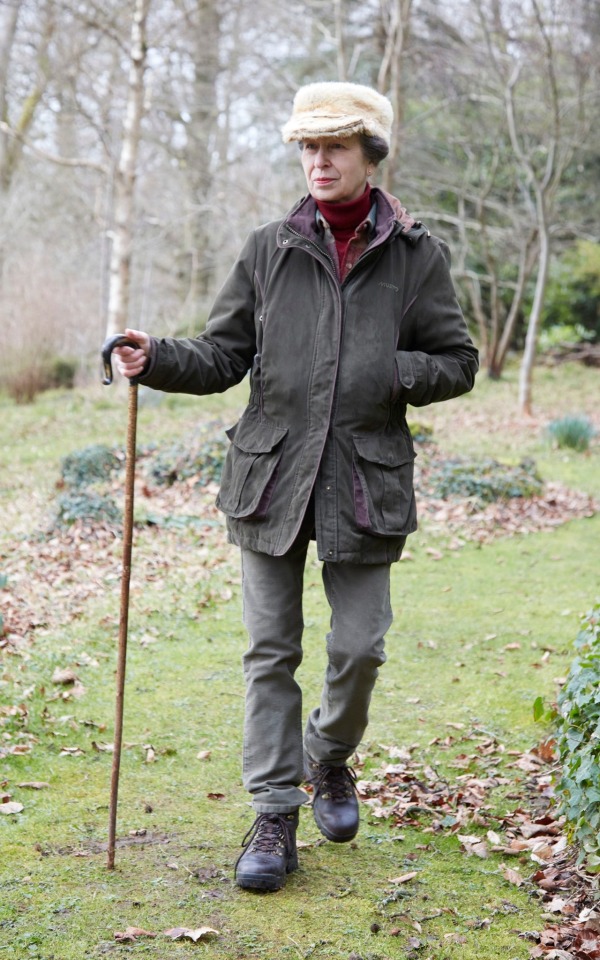
Her first official engagement was at the age of 18; shortly afterwards, in 1970, she became president of Save the Children – a position that led to her being nominated for a Nobel Peace Prize – and her work with that charity continues to this day.
Early on, her father, the Duke of Edinburgh, advised her to pick the charities she was interested in – and her interests have multiplied.
But one charity that is particularly close to her heart is the Whitley Fund for Nature, which is why I’m here. Started by Edward Whitley OBE as the Whitley Awards, WFN is now celebrating its 30th anniversary, and the Princess has been a patron for 24 years.
The annual ceremony takes place at the Royal Geographical Society in London and is colloquially known as the Green Oscars; WFN distributes grants totalling around £500,000 to worthy international winners.
So far, £20 million has been awarded to 200 conservationists across 80 countries. And the Princess has never missed a single ceremony, presenting the awards and delivering heartfelt speeches.
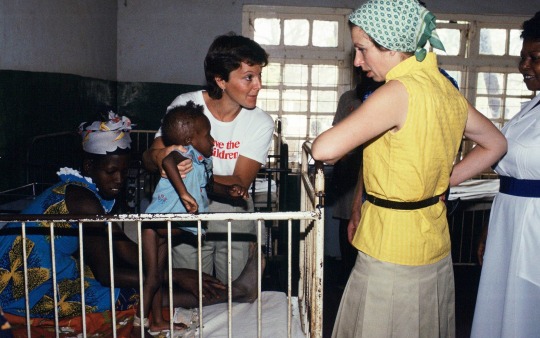
HRH is quite probably the most respected member of the Royal family. Her lack of pomp and ceremony and the low-key dedication with which she carries out her duties is much admired. There is no whingeing. She refused titles for her children, Peter and Zara.
She is well known for her dry sense of humour. She is an exceptionally accomplished horsewoman and in 1976 became the first member of the Royal family to compete in the Olympics; she had won Sports Personality of the Year five years earlier. She famously resisted an attempted kidnap in 1974.
She has also become an inadvertent style icon, often rewearing outfits she first wore decades ago, which is both charmingly thrifty and impressive in that she can still fit into them, and she seldom buys anything that is not made in the UK.
She recently made a good-natured appearance on her son-in-law Mike Tindall’s podcast The Good, the Bad & the Rugby and she seems like an all-round good egg.
She has both gravitas and spirit – there was some very moving footage of her accompanying her mother’s coffin on the long journey from Balmoral to Westminster Abbey.
Back in St James’s Palace, Charles, her private secretary, is arranging the chairs, anticipating where she might like to sit. HRH arrives in a striking bright-green suit over a striped silky shirt and heads smartly for a different chair than the one offered.
How did she first get involved with Whitley? ‘That’s entirely Edward’s fault,’ she says in her crisp voice. ‘But the common denominator is Gerald Durrell.’
The Princess grew up reading Durrell’s books and became patron of his zoo in Jersey, part of what is now the Durrell Wildlife Conservation Trust, in 1972. ‘He very kindly asked me to become involved in the zoo – as it was then – in Jersey, and Edward [later became] one of Durrell’s trustees.
‘He and I had similar beliefs in what Gerald was doing. Apart from the fact that Gerald wrote very good books, during his travels he seemed to understand better than most the impact on the populations in which animals lived and the relationship between them and their animals.
‘Being told you have to save this, that and the other is all very well but have you been there? Have you ever tried living in that environment to find out what that means to them? Because the fundamental point is that unless the conservation comes from the local area, it won’t be sustained.’
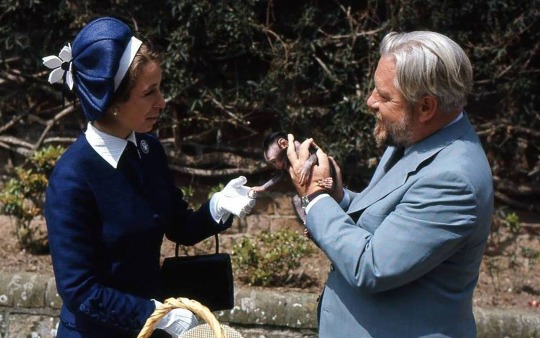
No one is going to save an animal just because they’re told to. ‘You’ve got to work out how the animals are going to survive with the people who live there, who will be the ones who make sure that it works.’
What was Durrell like? ‘Every bit as entertaining as you would think. His humour but also his understanding of the relative importance of things in other people’s lives was absolutely fascinating – and he was spot on.’
Durrell said he felt ‘sympathy for the small and ugly; since I’m big and ugly I try to preserve the little ones’. He was an expert on captive breeding, with a view to releasing into the wild, and he tended to select animals that were close to extinction, or those that could best be helped, or just ones that were not very charismatic.
‘Yes, not the sexy ones,’ says the Princess. ‘Or the obvious ones. His approach was very holistic. He understood the impact of habitat – not just on one species but how all of the things that lived in that habitat related to each other and that you couldn’t replicate that instantly somewhere else – it was very specific to an area.’
Gerald Durrell died in January 1995, of septicaemia. He was an alcoholic and had successfully received a liver transplant but died of complications it gave rise to. ‘He told me that there was no point doing a transplant because his old liver had got used to being fed all the things he’d been given to eat and drink in order to make deals as he went round the world,’ the Princess says, smiling.
Durrell’s legacy is long. One of his innovations was to establish training for conservationists from around the world. The first trainee went on to become the first director of the National Parks and Conservation Service in Mauritius, and thousands of students from 151 countries have since attended the centre, whose graduates became known as Gerald Durrell’s Army.
This became the title of a book by Edward Whitley, who travelled round the world to assess the progress of some of the trainees and the animals they were conserving – such as the largest eagle in the world in the Philippines and Alaotran gentle lemurs in Madagascar.
To launch the book in 1992, Whitley was invited to give a talk at the Royal Geographical Society, and he asked the Princess to come along. It was at the book launch that he decided to set up the charity.
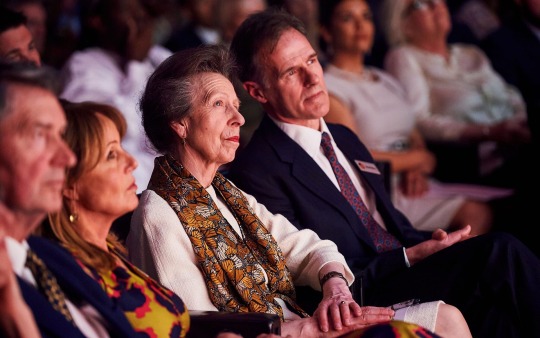
‘I sat down with Nigel Winser, who was the deputy director of the RGS and a long-time friend, and we designed what became the Whitley Awards on the back of a napkin,’ he tells me. In 1999, Whitley asked the Princess to become a patron. By then, ‘Attenborough was already on board, which encouraged her to think it wasn’t a fly-by-night organisation which would crash and burn’.
The awards focus on community-based conservation projects around the world. In order to qualify, each project has to be up and running – it cannot be a pipe dream. Initially there was only one award; this year there were six – of £40,000 each in project funding – plus a Gold Award of £100,000, given each year to a past winner in recognition of their outstanding contribution to conservation.
‘The reason WFN is so effective,’ says Alastair Fothergill, whose company Silverback made the acclaimed TV nature series Wild Isles, and who like Attenborough is a WFN ambassador, ‘is because its grants are awarded at the very cutting edge of conservation, where relatively modest funds can go a long way. Over the years, the fund has kickstarted the careers of many pioneers who have become leading lights in conservation.’
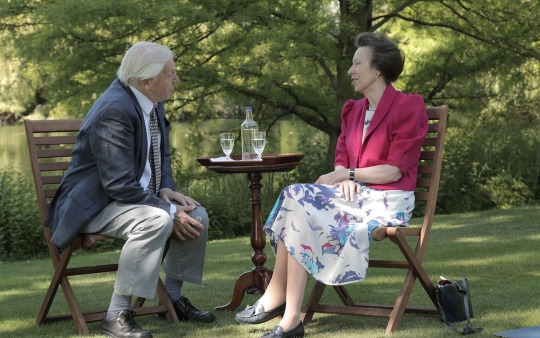
This year’s projects included safeguarding seabird nesting sites in Mexico; establishing ‘lion guards’ promoting coexistence in Cameroon; and protecting pangolins in Nepal, lemurs in Madagascar, freshwater fish in Lake Victoria and saiga antelope in west Kazakhstan. Each one heavily involves local communities.
In addition, WFN provides continuation funding for award-winners. To mark the 25th anniversary of Whitley, Kate Humble, also an ambassador, and Attenborough hosted an event at the Natural History Museum to help raise £1 million for continuation funding.
‘It was the first really big fundraiser we had,’ says Humble. ‘And one of the donors underwrote the entire cost of the event – so everything raised went into the continuation fund.’
The RGS ceremonies are joyous events. In addition to being presented with their award by the Princess Royal, each winner has a short film made of their work, narrated by Attenborough, screened at the event. ‘I’ve been going for 20 years,’ says Humble, ‘and every year I’m blown away by the winners – what they’ve overcome, what they’ve achieved.
‘You hear so much bad news, and you think, you know what? The world can be OK because people out there are doing this stuff – it’s demonstrable, it’s scientifically rigorous and it’s working. [It’s] an incredibly uplifting and inspiring evening.
‘And every year I watch Princess Anne speak and she never sounds like she’s reading someone else’s words. She cares deeply about what this charity does and what these people who win the awards have achieved – she is not a figurehead just trotting out nice words and providing a photo op. She could run the charity, she knows it so well and cares about it so deeply.
‘I’m not anti-royal,’ says Humble, ‘but neither am I someone who would go and wave a Union Jack. But when I see her I think, frankly you’re worth whatever it is we pay.’
HRH talks with fluency and knowledge on every subject. ‘She’s like a sponge – it’s unbelievable the information that’s stored in her brain,’ said her daughter Zara in an interview for ITV’s Anne: The Princess Royal at 70. ‘It’s quite annoying as well.’
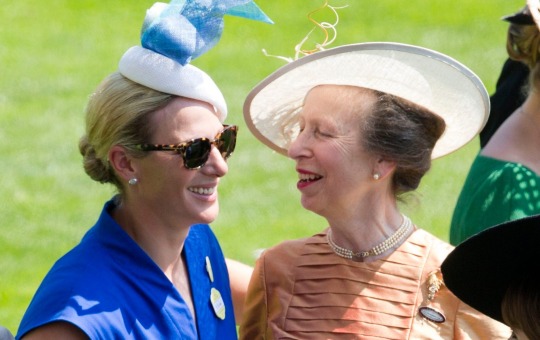
She needs to know a lot because she works with a diverse range of charities, taking in early years, healthcare, microfinance and animal welfare. Promoting collaboration between charities is key. ‘I do a lot of that,’ she says now. ‘I have meetings bringing them together which they all seem to enjoy, though sometimes it’s a bit illogical.
‘Knitting together all the international NGOs is important, but we need to look slightly outside the box – can we do this better, are there ways of helping people to be more sustainable?’
The Princess does occasionally discuss conservation with the King, she says, but she won’t say if they always agree. And her grandchildren? How does she teach them about conservation? (She has five, four girls and a boy.)
‘I don’t see so much of them but making the point that they live in an area which they shouldn’t take for granted is important I think; both my children are aware of that.’
Gatcombe Park in Gloucestershire, where the Princess and her husband, Vice Admiral Sir Timothy Laurence, live in an 18th-century manor with 730 acres of parkland, has some beautiful trees – ‘the ones that survive – quite a lot don’t, we live on Cotswold brash which is not popular with plants; but having said that we have beeches.
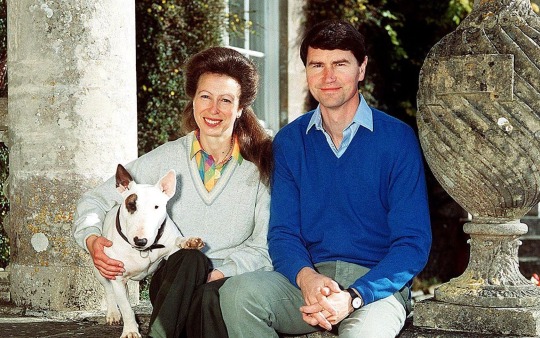
‘You’ve just got to live with what’s there and make sure it doesn’t get overwhelmed. I’m not sure that rewilding at scale is necessarily a good idea – it probably is in corners, but if you’re not careful you rewild all the wrong things because they are just the things that are more successful at growing.
‘My biggest row at home is ragwort. Lots of people think that ragwort is absolutely brilliant because butterflies love it, but it’s not good for the horses [it is toxic]. I would say don’t take all the ragwort out, just where the horses are – but it’s quite a delicate balance.’
There are, she says, ‘quite a lot of horses at home, but they’re other people’s as well’. She rides whenever she can. ‘It’s a very good place to observe nature from.’
The Princess supports several horse-related charities, and became patron of Riding for the Disabled in 1971, and president in 1985. ‘It was just becoming a national body when I was invited to become a patron – at that stage I knew nothing about disability but the concept that ponies or horses could make a difference was obviously interesting and I knew about them. No matter what the disability was, the answer was, if they’d like to ride, we’ll give it a go. The commonality of the experience was important.’
Essential things for running a charity, she says, are evaluation and thinking of the long term. She cites the influence of Eglantyne Jebb, founder of Save the Children, ‘who constantly evaluated programmes to see if they were making a difference, whether they were doing the right things and whether people were invested’.
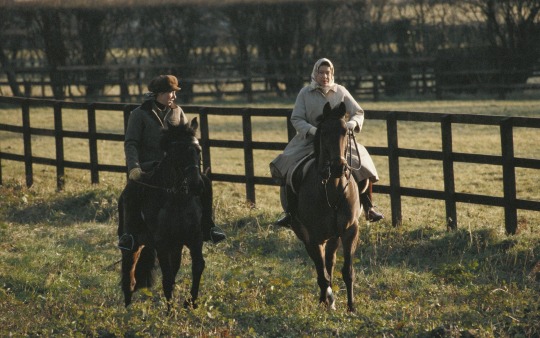
And it’s important to keep projects focused and manageable. ‘I’ve come to the conclusion that scale is the thing that defeats any good idea, because it can get to a size where people can’t cope.’
She has spoken in the past about the huge value of long-term commitment, in terms of the constitutional monarchy as well as in charity work. ‘Seeing things in the long term is a challenge,’ she says now, ‘but maybe part of our [value] – as a family – is long-term continuity, because the long-term view is quite hard to come by. And I think we can do that.’
May I ask what she might have done as a profession in another life? HRH laughs and looks vaguely impatient. ‘You can ask but I’ve no idea.’ Does she ever think about that?
‘Not really, and it’s way too late to have those concerns – in a way the fortunate part of my life has been the broad spectrum, to see so much. Not having a very specific interest has been a bonus, I suppose. We all have ways of doing things and with Whitley it is the practical aspects of what they do, and how to support them [that has been my focus].’
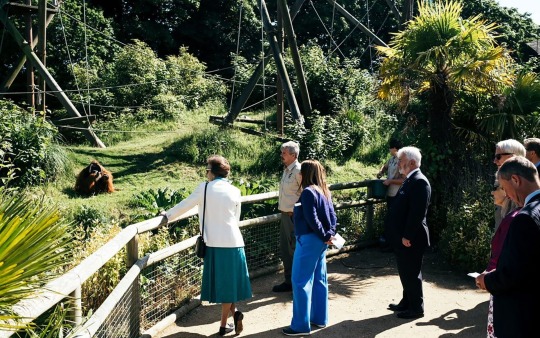
Edward Whitley, a member of the wealthy Greenall Whitley brewing family, set up Whitley Asset Management in 2002, alongside its finance director Louise Rettie, to serve a small number of clients. But there had always been animals in his life – his great-grandfather founded a small charity called the Whitley Animal Protection Trust; his great-great-uncle Herbert was an eccentric animal breeder who started Paignton Zoo.
In Edward’s office is a stuffed cockatoo that belonged to Herbert and a photograph of Mary, his favourite chimpanzee. Mary was famous for riding around on her tricycle and walking the dogs, or taking visitors by the hand and leading them round the zoo.
Edward studied English at Oxford then went into banking, joining NM Rothschild & Sons in 1983. He left in 1990 to write: Gerald Durrell’s Army came out in 1992 and he also co-wrote Rogue Trader, the autobiography of disgraced banker Nick Leeson, and worked with Richard Branson on his memoir.
Whitley is a tall, gentle man who doesn’t like talking about himself but is full of unbridled enthusiasm for WFN, and in particular its royal patron. ‘She transformed the charity – we never would have had the success we’ve had without her involvement. She saw what was possible and really helped us to achieve it, and she inspires the winners to do more. The winners are always pretty amazed at how she cross-examines them and cuts to the chase so quickly when she meets them.
‘She has an encyclopaedic knowledge of the world, and a phenomenal memory, and she is also very funny… And think of her father and the Duke of Edinburgh’s Award – she’s seen what a lifetime of work can achieve.’
In her speech at the Whitley Awards earlier this year, the Princess Royal cited her father, Gerald Durrell and Edward Whitley as the inspirations for her work with WFN. Among winners and their communities, she said, ‘it’s the global ambition to truly make a difference that has been astonishing’.
The awards, she continued, are for ‘the people on the ground, they’re the sharp end… It’s all very well to be here and understand what we think are the challenges, and want to make a difference, but when you meet the people who are actually out front and can turn that into a reality, it’s a real inspiration.’
Over the years, she has visited some of the winners’ projects, when her charity work takes her to those countries, ‘but not as many as I would like’, she says. In Uganda, for example, she met Dr Gladys Kalema-Zikusoka, who was working on improving hygiene in local communities after viruses had spread to gorillas she was managing in Bwindi national park. And in 1997, before she became a WFN patron, she travelled in a boat up the Amazon to see pink dolphins.
‘She was in Colombia for Save the Children and she asked the British embassy to include a visit to the Amazon in her trip – she was very interested in the dolphins,’ says Dr Fernando Trujillo, who went on to win an award in 2007.
‘The British embassy contacted me as an expert on rivers and dolphins. I was a little bit intimidated, and it was raining and I was worried we wouldn’t see any dolphins, but in the end we counted 32 – and she was so excited, every time she saw one she would jump up and down with excitement, and then rein herself in as if she suddenly remembered she was a princess. I could see her love for the environment was very genuine. From that day she was my favourite royal person.’
Another winner, Pablo Bordino, whose picture with HRH had been in the paper in Buenos Aires was flying back to Argentina. One of the flight attendants recognised him and when he arrived at the airport there was a television crew waiting to meet him. It raised the profile of his NGO - which protected marine life and habitats in Argentina - enormously and enabled him to generate further funding. ‘That’s the effect HRH has,’ says Whitley. ‘You can’t quantify it.’
Several award-winners went to the Princess’s 60th-birthday celebrations, including Claudio Padua, a successful businessman from Rio who gave it all up to pursue conservation, training at Durrell in Jersey and moving to a forest in Brazil with his wife, Suzana, and three children.
HRH had been to see them at their headquarters outside São Paulo and had taken an interest in their efforts to conserve the black lion tamarin, a monkey. They had no idea her visit would be such an ordeal, with all the security arrangements. ‘We had a call to ask what kind of security we had,’ says Claudio. ‘I said, “I have an old dog, that’s all.”’
‘She turned up with a security detail and entourage,’ Suzana adds. ‘They wanted to go into the forest to see the monkeys in our Land Rover and her security team asked, “Has this car been checked?” I said it hadn’t and they became very nervous but she ignored them and just got in anyway.’
Years later, the Paduas were invited to Buckingham Palace for her 60th. ‘It was a beautiful opportunity for us,’ says Suzana, ‘and as she came down the stairs she spotted us and said, “Oh how nice to see you. How are the monkeys?”’
The Whitley Fund for Nature is hosting a #PeopleforPlanet biodiversity summit on 6 and 7 November at London’s Royal Institution, where members of the public can hear live from Whitley Gold Award-winning conservationists from Africa, Central and South America, and Asia
#a new anneterview!#I love that she seems to remember everything and everyone#the part about her jumping up and down when she saw the dolphins#what a mood#princess anne#princess royal#british royal family#brf#newspapers#anned i quote
93 notes
·
View notes